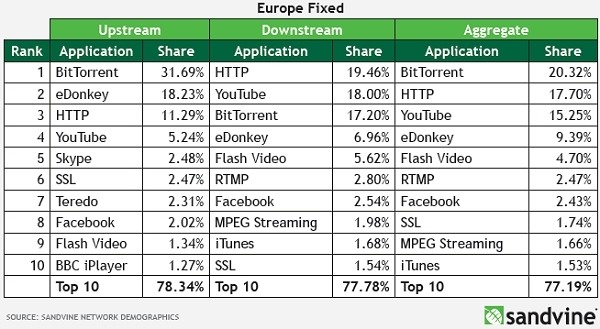BitTorrent usage is on the decline in the US largely as a result of consumers having access to legal online content options. This trend isn't echoed in other parts of the world where access to legal content is either restricted or delayed significantly.
A new report from Sandvine (PDF) shows that BitTorrent traffic has dropped to just 12.7 percent in the US during peak hours. This is down from 17.3 percent last year but as TorrentFreak points out, these numbers don't account for the fact that traffic in general has increased. Even still, the results show that BitTorrent traffic has seen very little to no growth during the past year.

BitTorrent traffic in Europe accounted for 20.32 percent of all Internet traffic during peak hours with file sharing client eDonkey adding another 9.39 percent to the traffic tally. In fact, P2P traffic has quadrupled in the past 18 months. In the Asia-Pacific region, BitTorrent accounts for close to 30 percent of the aggregate Internet traffic and a whopping 43.89 percent of upstream traffic.
"We see higher levels of P2P filesharing than in many other regions, at least partially due to geographical licensing challenges that restrict the availability of legitimate Real-Time Entertainment services," according to the report.
The theory that legal options are curbing BitTorrent use in the US can be backed up by looking at the ever-increasing traffic share of Netflix. The streaming company was responsible for 32.9 percent of downstream Internet traffic in the first half of 2012, a slight increase over last year and roughly 12 percent higher than the same time period in 2010.
Competitor Hulu also saw significant gains in the past six months, climbing to 1.6 percent of overall traffic. YouTube traffic grew from 11.3 percent to 13.8 percent in the same six month period.
If nothing else, this data illustrates that consumers aren't just out to get media without paying for it. Consumers just want to consume and will largely pick a trusted, paid source over an illegal method. It's just a matter of time before the entertainment industry picks up on this trend in other parts of the world.